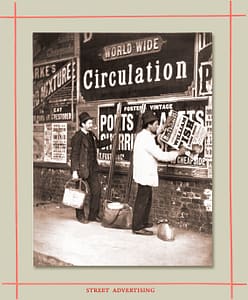
BRITISH energy in advertising, equalled only by American enterprise, has in any case this advantage, that it gives employment to many destitute individuals who would otherwise become burdens to the parish or swell the list of our criminal classes. In this respect the system of advertising by means of boards, which the men themselves carry on their backs, has proved the most useful, as this is a work which anyone can perform, and therefore boardmen, as they are called, are often recruited among the most hopeless of our poor. The men who paste bills on the hoardings, &c., are, however, considered a grade higher in the social scale, though their antecedents are generally more humble and less interesting. The boardmen are often men who have fallen in the world, some have even once enjoyed the title of “gentlemen,” boast of an excellent education, but have been reduced to their present pitch of degradation through what they fashionably term dipsomania!
Bill-stickers were described to me as more independent than the boardmen, less subject to insult, but at the same time not so ambitious and more contented. This is due to the fact that many of them have never done anything else, and were, as my informant put it, “born in a paste-can.” As a rule, also, when once a man has become proficient in the art of bill-pasting, he rarely abandons this style of work. Nor is it quite so easy as it may seem. There is a certain knack required in pasting a bill on a rough board, so that it shall spread out smoothly, and be easily read by every pedestrian; but the difficulty is increased fourfold when it is necessary to climb a high ladder, paste-can, bills, and brush in hand. The wind will probably blow the advertisement to pieces before it can be affixed to the wall, unless the bill-sticker is cool, prompt in his action, and steady of foot. Thus the “ladder-men,” as they are called, earn much higher wages, and the advertising contractors are generally glad to give them regular employment. The salaries of these men vary from £I to £I 15s. per week, and they work as a rule from seven in the morning to seven at night. It is, however, difficult to exercise any strict control over the amount of work they do, for as they are constantly travelling about they cannot be easily watched.
Sometimes when there is a stress of business, the contractors are less scrupulous as to the men they employ, and then they are picked out from the common lodging houses, recruited at the Seven Dials, or even disinterred from the workhouses. These men of course earn less; that is to say, 16s. or 18s. per week; but it is an agreeable change from the stricter discipline and monotony of the workhouse. One large contractor pays his men by the hour, and if it rains will not pay them at all: a system which has proved very economical during this extraordinarily wet winter, but which was most disastrous to the bill-stickers themselves. Altogether the pasting of advertisements on walls and hoardings must give constant employment in the metropolis to about two hundred men, not to mention the foremen and superintendents who ride round to see that the work has been properly done.
Fortunately there is as much advertising in summer as in ·winter. Towards Christmas the theatres blazon forth the most gaudy announcements of their performance, and are less pushing in the summer; but, on the other hand, the railway companies profit by the fine weather to advertise most extensively their pleasure excursions, &c. Over and above this comparatively regular work there are constantly new enterprises which must be promoted by the most startling publicity.
Apart from the legitimate bill-sticking on hoardings for which rent is paid, there is also another and special branch of work called” fly-pasting,” and this is practised principally in the summer. It consists of sending men out to certain distances, either on foot or with a cart and van, to post bills indiscriminately wherever they can find a convenient spot which is not let to, and reserved by a contractor.
The road selected generally leads to a racecourse, or to some other great rendezvous. Now the road to the university boat-race is the scene of extraordinary activity on the part of the bill-stickers. They often start at two in the morning on the day of the race and paste their bills up all along the road. But rival bill-stickers soon make their appearance, and the paste of one bill is hardly dry before another one is daubed over it. Thus the contractors have to send out a fresh batch of men a few hours later to paste each other out. For instance, a firm in Soho assured me that they sent out men on the boat-race day at two in the morning, then at six o’clock, again at eight, and finally at ten, with orders to paste their bills over all other advertisements. The men engaged in this fly-pasting generally make 4s. a day, and during the winter months some of them become boardmen.
The value of advertising space, where it is secured and not subject to obliteration inflicted by some rival “fIy-paster,” is absolutely fabulous. More than £300 a month was paid a short time ago for some hoardings in Queen Victoria Street; and, altogether, I was assured by a gentleman who has been in the trade for a long time, and enjoys every opportunity of making a fair estimate, that upwards of £60,000 was paid annually for the possession of hoarding and wall space in London to let out to advertisers. Indeed, so much money is made in this way, that there are certain houses standing in conspicuous places by the railway lines, which are not pulled down, though in ruins, because it pays the owners better to let the outside walls for advertising than to let the interior for dwelling purposes.
The largest contractors in London are certainly Messrs. Willing and Co., and Mr. Thomas Smith. The latter gentleman, though not possessing absolutely the oldest business, has been longer in the trade than the head of any other firm, and may be considered as the parent of several of the newest and most ingenious forms of advertising; while, among the more recent men, the young blood of the trade, Mr. Walter Smith seems to have secured important contracts. If I have ventured to record the success of these two latter gentlemen, it is not that they are known merely as prominent business men, but because of the popularity they have acquired among the bill-stickers themselves with regard to the all-important question of the wages.
Politically and socially speaking, our chief difficulty is to dispose advantageously of unskilled labour. The contractors for boardmen and bill-posting have, as far as the extent of their business will allow them, offered a solution to this problem; and street advertising has, I may repeat, undoubtedly kept many a person from the workhouse.
A.S.
